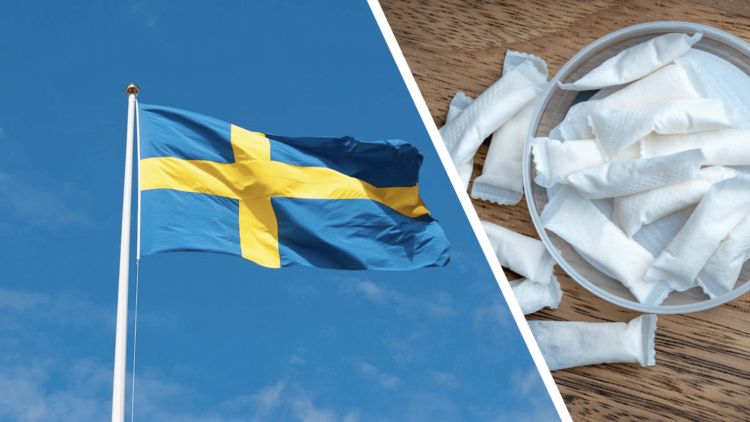
TED revision: Sweden needs more influence over EU nicotine tax proposals
A letter signed by 15 EU finance ministers urging the European Commission to push ahead with revisions to the Tobacco Excise Tax Directive (TED) has raised alarm bells that the proposed TED revision ignores the harm reduction example set by Sweden.
According to a report in the Financial Times, the letter requested that European Commission president Ursula von der Leyen “take without delay the necessary steps in order to update the [tobacco taxation directive]”.
TED revision: long-delayed and controversial
Last updated in 2011, the EU’s Tobacco Excise Tax Directive (TED) establishes minimum excise duty rates for cigarettes and other tobacco products.
A TED revision was originally scheduled for 2022 but was delayed due to economic instability.
The revision would set minimum tax rates not only for cigarettes but also for novel products like vapes, heated tobacco, and nicotine pouches.
In their letter, the finance ministers of Austria, Belgium, Bulgaria, Czechia, Denmark, Estonia, Finland, France, Germany, Ireland, Latvia, The Netherlands, Slovakia, Slovenia, and Spain argue the current version of the TED is “insufficient” due to the emergence of new nicotine products such as vapes and pouches.
The ministers also cite the “significant challenges posed by ongoing developments and trends in the European tobacco market” as reason to move forward with TED revisions.
Yet the proposal remains divisive. Twelve member states, including Italy and Greece, have refused to support it.
Their concern?
That excessive taxation could exacerbate black markets and disproportionately impact smokers in countries already grappling with economic pressure.
Among other things, they want to see the EU harmonise taxes on both traditional and alternative nicotine products, reigniting a debate that cuts to the heart of public health policy.
While proponents argue the move would modernise outdated tax structures and combat fraud, critics warn it risks undermining effective harm reduction strategies, particularly those that have proven capable of delivering positive results in Sweden.
Sweden’s success story
Amid this policy tug-of-war, Sweden stands apart, not only because it has the lowest smoking rates in the EU, but because it achieved this without resorting to aggressive, punitive taxes on safer nicotine products.
“Sweden has the cheapest cigarettes in Scandinavia, and the lowest smoking rates,” points out Patrik Strömer, Secretary General of the Association of Swedish Snus Manufacturers.
“That’s not a coincidence—it’s a result of letting consumers choose safer alternatives like snus and nicotine pouches without punishing them through excessive taxation.”
Unlike cigarettes, which are directly linked to diseases like lung cancer and cardiovascular failure, nicotine pouches and snus are smoke-free and significantly less harmful.
In Sweden, these products have played a vital role in helping smokers quit, so much so that the country is on the cusp of reaching the WHO’s “smoke-free” benchmark of less than 5 percent daily smoking.
A fair framework, not a punitive one
Strömer isn’t opposed to taxation altogether—only to a model that penalizes low-risk products more than they merit.
“A reasonable principle for taxation is something Sweden already adopted,” he says.
“And I do have hopes here, because the Swedish Government objected strongly in November 2022.”
Strömer suggests the Swedish level of a €20 per kilogram minimum tax on nicotine pouches as a way to establish an EU-wide framework without jeopardizing accessibility.
By contrast, leaked Commission proposals have suggested a minimum of €120 per kilo, which Strömer warns would make cigarettes the more attractive option for price-sensitive consumers.
“A tax rate of €120 per kilo would put cigarettes in a very favourable position,” he says.
“And that’s the opposite of what public health policy should aim for.”
Strömer is not alone in his concerns about the unintended consequences of high taxes on tobacco and nicotine products.
Speaking to EU affairs publication Euractiv, a diplomat representing a southern state in Brussels claimed that high tobacco taxation in France and the Netherlands led to black markets and increased cross-border shopping.
The diplomat accused policymakers in Paris and The Hague of pushing others to “repeat the same mistake”.
What Sweden needs to do now
For Sweden, the challenge is twofold: defend its successful harm reduction model at the EU level, and convince other nations to look at outcomes, not ideology.
Strömer believes Sweden must continue to push diplomatically.
“We need to ensure the Swedish Government maintains its position and collaborates with like-minded nations,” he explains.
“The goal should be to shape a directive that reflects real-world health data, not moralistic assumptions.”
According to notes from a recent meeting of the Swedish Ministry of Social Affairs to discuss public health policy, the government does view EU tobacco rules as “an important tool for protecting public health” but that regulations should be “proportional” in their ambition to protect vulnerable groups, including children.
“This seems to indicate that Sweden would reject any proposed new rules that are not proportionate or which don’t aim to protect sensitive groups.” Strömer added.
TED revision a ‘critical inflection point’
He also stresses the importance of involving stakeholders from healthcare and consumer groups in the discussion.
“Doctors in Sweden are finally starting to recommend alternatives like snus to smokers. We must not let misguided regulation from Brussels undo that progress,” he says.
The TED revision represents a “critical inflection point” for Europe’s tobacco policy, Strömer believes.
Get it right, and the EU could follow Sweden’s lead in reducing smoking rates through pragmatic harm reduction. Get it wrong, and decades of progress risk being undone.
“We can’t afford to ignore what works,” he says.
“If we want a smoke-free Europe, we need policy grounded in evidence – not dogma.”




